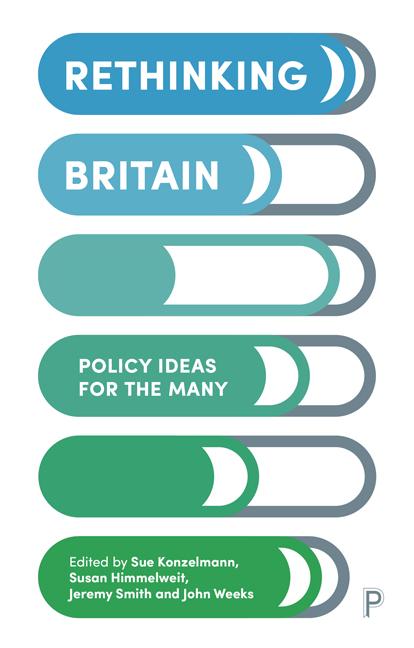Book contents
- Frontmatter
- Contents
- List of Tables and Figures
- The Contributors
- Foreword
- Introduction
- Interlude: ‘Mirror, Mirror, On the Wall – Who has the Highest Debt of All?’
- Part One Building a Full-Employment Economy: Introduction
- Part Two Public Investment – Prioritising Society Rather than Profit: Introduction
- Part Three Making Finance Work for Society: Introduction
- Part Four Genuine Social Security: Introduction
- Part Five How to provide for Social Needs: Introduction
- Conclusion
- Jargon Busters
- References and Further Reading
- Index
5 - How do we Build a Sustainable Economy?
Published online by Cambridge University Press: 11 March 2021
- Frontmatter
- Contents
- List of Tables and Figures
- The Contributors
- Foreword
- Introduction
- Interlude: ‘Mirror, Mirror, On the Wall – Who has the Highest Debt of All?’
- Part One Building a Full-Employment Economy: Introduction
- Part Two Public Investment – Prioritising Society Rather than Profit: Introduction
- Part Three Making Finance Work for Society: Introduction
- Part Four Genuine Social Security: Introduction
- Part Five How to provide for Social Needs: Introduction
- Conclusion
- Jargon Busters
- References and Further Reading
- Index
Summary
What's the issue?
Economic growth is the UK's overall policy goal; Section 108 of the Deregulation Act 2015 requires anyone in a regulatory function to have ‘regard to the desirability of promoting economic growth’. However, this is at odds with environmental sustainability, and it isn't necessary for achieving things like full employment or a better quality of life. Even Simon Kuznets, who first developed the indicators of economic growth, warned that an economy should not be managed on this basis. A different philosophy, which prioritises people and the environment rather than an often misleading number, is clearly needed.
What policies would support a sustainable economy?
Analysis
Figure 6 below shows the UK's material footprint compared with GDP. This is one of the best environmental pressure indicators available, measuring all the materials required to support consumption, regardless of where they originate. Although it has been suggested that economic activity can be separated from environmental impact (‘green growth’), there is little evidence to support the idea. The UK's material footprint has actually increased faster than GDP, while globally (especially since 2000), it parallels GDP.
The relationship between GDP and environmental pressure matters, because resource use is already unsustainable. A major 2015 study in the journal Science identified nine boundaries essential to the planet's continued equilibrium, four of which – climate change, biodiversity loss, land use change and biogeochemical flows (phosphorus and nitrogen) – had already been crossed. The study concluded that transgressing even one of these boundaries could lead to catastrophic changes.
Even if we found an economic growth strategy that didn't use resources or negatively impact the environment, there is evidence that more growth in wealthy countries might not be worthwhile anyway. Although UK per capita GDP has more than tripled since 1950, its citizens are no more content; surveys of happiness and life satisfaction suggest that – beyond the level required to meet relatively basic needs – additional money does not buy additional happiness. Once those basic needs are met, things like relationships, health, living in a safe community and working in a secure job become more important to wellbeing than more income from extra GDP.
- Type
- Chapter
- Information
- Rethinking BritainPolicy Ideas for the Many, pp. 80 - 83Publisher: Bristol University PressPrint publication year: 2019



